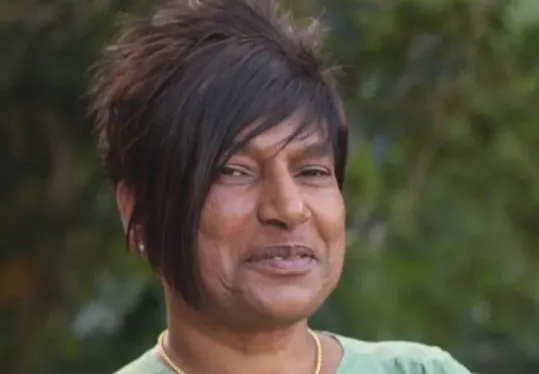Justice in the balance: has advocate Shamila Batohi delivered on her promise to fix the NPA?
Between integrity and the quest for justice

National Director of Public Prosecutions, advocate Shamila Batohi.
Image: Henk Kruger / Independent Newspapers
As advocate Shamila Batohi's tenure as the National Director of Public Prosecutions draws to a close in January 2026, Professor Nirmala Gopal explores the triumphs and challenges she faced in a quest to revitalise South Africa's justice system.
“Justice is not about speed, but about doing things the right way.” - Advocate Shamila Batohi (June 2025).
THE above quote pertinently suggests the need for ethics and professionalism as necessary ingredients for justice in a country where the majority of citizens, historically deprived of justice, were promised the ushering in of democracy. Let me unpack advocate Shamila Batohi’s tenure as National Director of Public Prosecutions (NDPP) since her appointment in 2019.
A new dawn that promised renewal
Upon her appointment, there was optimism among South Africans that she would restore the National Prosecuting Authority (NPA) from the challenges posed by political interference and corruption. Batohi, a distinguished legal professional with international experience at the International Criminal Court (ICC), was regarded as an emblem of integrity. Her selection by President Cyril Ramaphosa signified what many perceived as a "new beginning" for the justice system in South Africa.
Rebuilding a broken institution
Upon assuming her position, Batohi discovered a prosecution service in a state of crisis. Years of mismanagement had resulted in a demoralised and deeply divided NPA. In a 2024 interview with News24, she characterised the institution she inherited as "hollowed out and captured." Her objective, as she articulated, was not solely to prosecute but to restore trust and enhance competence from the foundation upwards.
Nonetheless, the NPA during her leadership achieved a commendable 93.4% conviction rate in the prosecution of organised crime cases, underscoring its commitment to effectively combat and diminish organised criminal activities. This commitment is further evidenced by the implementation of a comprehensive organised crime strategy, which emphasises collaboration with essential partners, including the South African Police Service (SAPS), the Directorate for Priority Crime Investigation, and the South African Revenue Service.
To meet both current and emerging challenges, the NPA is enhancing its internal analytical capabilities, paving the way for a stronger future. Thus, she is leaving behind strong foundations, sometimes a huge and complex challenge to achieve in a justice environment, specifically in a South African context.
Additionally, in May 2023, the NPA proudly welcomed 700 young professionals into the Aspirant Prosecutor Programme, marking the largest intake since its relaunch. Despite financial constraints that prevented a new intake for 2024, the NPA has set plans in motion for a smaller cohort in 2025, ensuring a steady stream of fresh talent that will invigorate the organisation. Another landmark legacy for which she will be fondly remembered.
Moreover, the NPA's annual report for 2024/25 not only celebrates an impressive 93.4% conviction rate in organised crime cases but also highlights 333 successful prosecutions in serious commercial crime matters. Furthermore, the Asset Forfeiture Unit made remarkable strides, recovering over R2 billion in assets related to corruption, showcasing the NPA's unwavering commitment to combating financial crimes (Daily News, June 2025).
Batohi underscores the NPA’s achievements aptly captured thus: "We are establishing the foundations for an NPA that cannot be captured again," during her address to Parliament in 2024.
The frustration of slow justice
The current climate surrounding the NPA reflects growing public frustration, particularly regarding the protracted nature of high-profile state capture cases. Despite notable advancements in prosecuting lower-tier corruption cases, the perceived stagnation in addressing more significant, systemic corruption has led to increasing cynicism among the public and political critics alike.
The recent acquittal of Pastor Timothy Omotoso exemplifies this discontent, prompting calls for the resignation of Batohi, who has been accused of failing to deliver the judicial accountability that citizens demand (IOL, June 2025).
Batohi's rebuttal, asserting that “Justice is not about speed; it’s about doing things right, not fast,” underscores her commitment to procedural integrity amid the pressures for expediency that often attend public prosecutorial processes (Central News, June 2025).
This viewpoint highlights her fundamental tension in the pursuit of justice, especially in an environment marred by both historical inertia and contemporary pressures.
Internally, Batohi has faced resistance to reform from elements within the NPA, which she has characterised as “not aligned with the vision of fighting for the rule of law” (IOL, June 2025).
In response, she has initiated a reorganisation of senior leadership and enhanced cooperation with entities like the Hawks and Special Investigating Unit (SIU) to bolster the capability and efficacy of investigations into complex corruption cases.
Nonetheless, these efforts are encumbered by persistent structural challenges, including chronic underfunding, the protracted nature of investigations, and a reliance on the collaboration of external agencies that can complicate and delay prosecutions.
As articulated by Professor Kelley Moult from the University of Cape Town: “The NDPP can’t fix the entire justice system, but she can set the tone for integrity and courage” (Mail & Guardian, May 2024).
This sentiment reflects a recognition that while systemic reform is necessary, the leadership style and ethical framework established by Batohi could serve as a critical foundation for fostering a more resilient prosecutorial environment.
Public trust: climbing, but cautiously
The recent Afrobarometer survey from 2024 indicates a modest increase in public trust towards the NPA, rising from 36% in 2018 to 43%. This marginal improvement highlights a gradual shift in public perception, yet it underscores a significant gap in the overarching goal of restoring faith in the justice system.
The mixed sentiments from various communities reflect a nuanced reality. On one hand, there is acknowledgement of the NPA's efforts to enhance its integrity and accountability, which represents a positive development. On the other hand, the frustration among citizens remains palpable, particularly concerning the perceived delays in achieving justice for ordinary people, juxtaposed with the leniency shown towards powerful figures who often escape stringent legal repercussions.
Nomusa Dlamini’s comments frame this dilemma effectively, emphasising the disparity between small-scale victories in the courtroom and the lack of progress in high-profile cases that resonate deeply with the public. This observation points to systemic issues within the justice system, where the prosecutorial focus appears to be skewed towards less impactful cases, potentially undermining broader trust in legal institutions.
The NPA faces multifaceted challenges. Structural inefficiencies, resource constraints, and the complexities of prosecuting influential individuals may contribute to the slow pace of justice delivery. Furthermore, the public's perception that elite individuals operate outside the law compounds distrust, as it feeds into a narrative of inequality that questions the very foundation of justice. Batohi had mammoth speed bumps to negotiate in efforts to sustain clean and pure justice- a justice untainted by criminals and political interference.
An uphill battle with a fragile legacy
Many legal experts, along with South Africa's highly capable population, agree that Batohi faces one of the most challenging roles in government. As the head of an organisation comprising over 4 000 prosecutors, she navigates a landscape where many are both overburdened and under-resourced.
Despite these challenges, the NPA, led by Batohi, has experienced increased stability, higher conviction rates in organised commercial crimes, and improved and enhanced transparency during her tenure. Furthermore, during her tenure, the NPA recovered billions in illicit assets and promoted ethical and professional leadership. However, some observers note that the weaknesses of the NPA under Batohi lie not in the efforts she put forth, but rather in the sheer scale of the obstacles she faced.
Community voices call for accountability
In various regions, including townships, cities, and rural areas, there is a perception among residents that the justice system operates unevenly. Many observe that the NPA is putting in significant effort, yet they feel the system tends to protect those in positions of power. Notably, Thabiso Mokoena, a resident of Soweto, commented: “Batohi’s trying - you can see that. However, until corrupt politicians face substantial consequences, there may be a belief that the system has not truly changed.”
Batohi’s tenure as NDPP has been a remarkable journey filled with both significant achievements and ongoing challenges. She has taken bold steps to rebuild a fractured institution, striving to restore faith in a system that many believe can deliver equal justice. Yet, the dream of a truly equitable legal framework in South Africa remains a work in progress.
The question looms large: will history remember her as the visionary who transformed the NPA, or as the leader who faced insurmountable obstacles? The answer hinges on the crucial developments that lie ahead. It's a pivotal moment, and the outcome will define her legacy and the future of justice in South Africa.

Professor Nirmala Gopal
Image: File
Professor Nirmala Gopal is an academic leader: School of Applied Human Science at the University of KwaZulu-Natal.
** The views expressed do not necessarily reflect the views of IOL or Independent Media.
Related Topics: